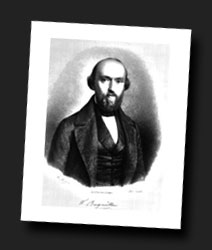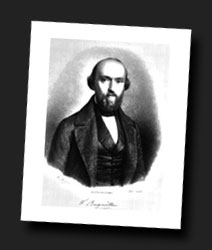Friedrich Burgmüller
Johann Friedrich Franz Burgmüller, generally known as Friedrich Burgmuller (4 December 1806 – 13 February 1874) was a German pianist and composer during the Romantic period. He is perhaps best known for his three collections of children’s etudes (or “teaching pieces”) for the piano, particularly his Op. 100 “25 Études faciles et progressives” (25 Easy and Progressive Studies) for early intermediate students. The other two collections, for more advanced students, were Op. 105 and 109.
See More :
- Ludwig van Beethoven
- Béla Bartó
- Johann Christoph Friedrich Bach
- Carl Philipp Emanuel Bach
- Thomas Attwood

Johann Friedrich Franz Burgmüller (1806-1874) was born in Regensburg, Germany. His father was a composer and musical theater director and founded the Lower Rhine Festival, still an important musical event in Germany.
Friedrich´s brother Norbert was also a pianist and composer, probably even more talented than his brother and father, but lacking their ambition and sociability. After studying with Ludwig Spohr and Moritz Hauptmann, Burgmüller moved to Paris where he stayed until his death. There he developed his trademark, light style of playing and became a fashionable writer of songs and salon pieces for piano. He also composed works for the stage including the ballet La Péri. Burgmüller also went on to publish several albums of descriptive piano studies, mostly intended for children that have become standard works and are very popular to this day. In particular, selections from his Op. 68, 76, 100, 105 and 109 and his “Ballade” have appeared in various educational anthologies. The twenty-five studies Op. 100 include some of his most popular works and the later opus numbers contain some more demanding studies.
Apart from these piano pieces, Burgmüller’s most often performed piece is the so-called Peasant Pas de Deux added to the ballet Giselle for its 1841 premiere. This music was originally titled Souvenirs de Ratisbonne, and is still performed today in every production of Giselle.
All pieces: |
||||
|---|---|---|---|---|
25 Easy and Progressive Studies Op. 100 |
||||
| 1. Candour | C Major | – | 2 | |
| 2. Arabesque | A Minor | – | 2 | |
| 3. Pastoral | G Major | – | 2 | |
| 4. The Small Gathering | C Major | – | 3 | |
| 5. Innocence | C Major | – | 2 | |
| 6. Progress | C Major | – | 4 | |
| 7. The Clear little Stream | G Major | – | 3 | |
| 8. With Grace | F Major | – | 4 | |
| 9. The Hunt | C Major | – | 4 | |
| 10. The Tender Blossom | D Major | – | 3 | |
| 11. The Wagtail | C Major | – | 4 | |
| 12. The Farewell | A Minor | – | 3 | |
| 13. Comfort | C Major | – | 3 | |
| 14. Styrian Dance | G Major | – | 3 | |
| 15. Ballade | C Minor | – | 4 | |
| 16. Gentle Complaint | G Minor | – | 3 | |
| 17. Chatterbox | F Major | – | 3 | |
| 18. Restlessness | E Minor | – | 4 | |
| 19. Ave Maria | A Major | – | 2 | |
| 20. Tarantella | D Minor | – | 4 | |
| 21. The Music of the Angels | G Major | – | 3 | |
| 22. The Gondolier’s Song | A-flat Major | – | 3 | |
| 23. The Return | E-flat Major | – | 5 | |
| 24. The Swallow | G Major | – | 4 | |
| 25. Trotting | C Major | – | 5 | |
18 Characteristic Studies Op. 109 |
||||
| 1. Confidence | C Major | 1858 | 3 | |
| 2. The Pearls | C Major | 1858 | 3 | |
| 3. The Shepherd’s Return | G Major | 1858 | 3 | |
| 4. The Gypsies | C Minor | 1858 | 3 | |
| 5. The Spring | G Major | 1858 | 4 | |
| 6. The Merry Maiden | C Major | 1858 | 5 | |
| 7. Lullaby | F Major | 1858 | 3 | |
| 8. Agitato | E Minor | 1858 | 5 | |
| 9. Morning Bell | A-flat Major | 1858 | 3 | |
| 10. Velocity | C Major | 1858 | 4 | |
| 11. Serenade | A Minor | 1858 | 4 | |
| 12. Awakening in the Woods | F Major | 1858 | 5 | |
| 13. The Storm | D Minor | 1858 | 5 | |
| 14. Song of the Gondolier | A Major | 1858 | 3 | |
| 15. Sylph | G Minor | 1858 | 4 | |
| 16. Parting | E-flat Major | 1858 | 4 | |
| 17. March | F Major | 1858 | 4 | |
| 18. Spinning Song | D Major | 1858 | 5 | |
Source by: pianosintheparks.com




Leave a Reply
Want to join the discussion?Feel free to contribute!